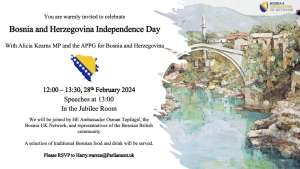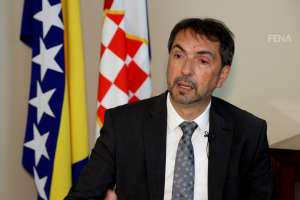SARAJEVO, March 15 (FENA) - We are leaving the European Union, but we are not leaving Europe. The UK will continue to be one of the most important countries in Europe: a leading member of the UN and of NATO, and the only European country to spend two per cent of its GDP on defense and 0.7 per cent on overseas aid, said in an interview with FENA, prior to tomorrow’s two-day visit to BiH, British Minister of State for Europe and the Americas at the Foreign and Commonwealth Office, Sir Alan Duncan.
“The stability of Europe, including the Western Balkans, is our stability. The prosperity of Europe, including the Western Balkans, is our prosperity. Nothing will change Britain’s unconditional commitment to the peace and security of our continent. We in the UK remember all too well the dark days of the 1990s. Seventy-two British service personnel died helping to bring peace to the region.
We want to help the Western Balkans continue on its path to stability. And we want to work with you to address today’s shared challenges, like terrorism, organized crime and migration. So our interests and yours are entwined, and will remain so,” said Duncan.
Duncan added that, actually, what we will see in the coming period is more UK, not less, as the country is leaving the European Union.
“Hosting the Western Balkans Summit in London is just the start. We have already tripled the amount of money we spend in BiH, and plan to spend still more,” noted Duncan.
Duncan stressed that his country is helping to create new jobs and opportunities for young people by introducing an online system for registering new businesses right across the country.
“And we have helped to create new transport and energy strategies to guide investment in these key sectors. So the UK will continue to stand alongside all those who want a better future for BiH,” he added.
Asked about how the UK Government views certain opinions that due to lack of the EU and NATO engagement, Russia penetrated the Balkans and is using the situation in BiH to undermine stability of Europe, he said that he does not believe that there has been any lack of engagement by the EU and NATO.
“On the contrary, we have invested enormous political energy and resources into this country over the past twenty years. But I am afraid that your leaders have too often chosen competition instead of cooperation and, as a result, BiH has not made the progress that it should have done on the path towards EU and NATO accession; and now, it has been overtaken by several of its neighbors. That is a real shame. We can only hope that your elections in October will bring newer and more positive energy,” underlined Duncan.
He added that Russia has been a partner on the Peace Implementation Council for many years. They have legitimate interests in trade and cultural exchange, which we respect. But Russia must also respect the interests and choices of BiH, and of its neighbors, and stop interfering in sovereign countries, as they tried to do unsuccessfully in Montenegro.
“BiH is a European country, and its interests lie firmly in Europe. Like every other country in the region, BiH has chosen to join the EU, and it’s easy to understand why, when 70 per cent of all your exports go to the EU, compared to just two per cent to Russia. The UK supports your choice, and will help you get there. Russia should do the same,” said Duncan.
One of the main topics of Duncan's visit will be the Western Balkans Summit to be held on 10 July this year.
“The London Summit isn’t happening in isolation. It is part of a series of important initiatives this year, all of which offer opportunities to BiH, and to its neighbors, to accelerate their Euro-Atlantic integration. For example, the EU recently published its new strategy for the Western Balkans, which charts a path for all six countries towards eventual membership of the European Union,” said Duncan.
In May this year, European and regional leaders will come together in Sofia to discuss the region’s European perspective for the first time since the Thessaloniki Summit in 2003. And then, in July, the UK will host its own Summit, which is the fifth in the series of the so-called Berlin Process.
“The Brits are practical people. And we want our Summit to make a real impact on the lives of citizens in Bosnia and Herzegovina. That’s why we will be focusing on very practical issues: tackling security threats like corruption and organized crime; strengthening regional cooperation on economic and infrastructure development; and helping young entrepreneurs, particularly in the fast-growing digital sector,” concluded the British Minister of State for Europe and the Americas at the Foreign and Commonwealth Office, Sir Alan Duncan in an interview with FENA.
(FENA) S. R.












